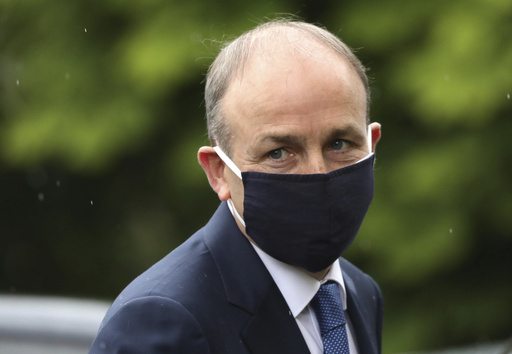
LONDON — The President of Ireland, Michael Higgins, officially dissolved Parliament on Friday, setting the stage for a crucial election on November 29 that will decide the future leadership of the country.
Prime Minister Simon Harris, who had until March to initiate elections, had previously announced this election date on Wednesday. Since the 2020 election concluded in a virtual tie, a significant coalition government has been in place, led by Harris’ center-right Fine Gael party in conjunction with its center-left counterpart, Fianna Fail.
Harris remarked, “We may not have been aligned on every single issue, but we consistently collaborated with the best interests of the Irish populace in mind.” He emphasized that it is now the appropriate moment to seek a fresh mandate from the Irish citizens.
Fine Gael and Fianna Fail, stemming from opposing factions during Ireland’s civil conflict in the 1920s, have shared a centrist philosophy and have alternated in governance throughout the years. In 2020, they set aside their historical differences and formed a coalition government, alongside the Green Party, which serves as a junior partner.
Sinn Fein, the left-leaning nationalist party, emerged with the most votes in the last election but was unable to form a government due to insufficient support. Centrist parties have distanced themselves from Sinn Fein because of its past associations with the Irish Republican Army and a long history of violence in Northern Ireland.
During the first half of the government term, Micheál Martin of Fianna Fail served as the Taoiseach, later succeeded by Leo Varadkar from Fine Gael in December 2022. Following Varadkar’s resignation earlier this year, Harris assumed leadership.
The challenges faced by Ireland are similar to those encountered globally since the last elections, including the consequences of the COVID-19 pandemic, economic impacts from the Ukraine conflict, and an influx of migrants.
Martin pointed out that the next five years would be particularly testing for the Irish economy, emphasizing the ramifications of worldwide conflicts and possible shifts in U.S. trade policy. “The most significant threat to the Irish economy is external,” he stated, highlighting the necessity for seasoned leadership capable of navigating through substantial economic disturbances.
Harris noted that their coalition had successfully safeguarded the population during the pandemic, offered support to Ukraine amidst its ongoing conflict, and managed to deal with the cost-of-living crisis. He identified several pressing issues for voters, including housing, immigration, and childcare.
Harris expressed satisfaction that the government had allocated funds to bolster resilience against potential future trade disruptions. “We were often scoffed at for this,” he mentioned, “but this is precisely why we have a buffer in place. It will protect us from trans-Atlantic economic shocks or any other disturbances, ensuring that my children will not undergo the same hardships we did.”
Reflecting on the past challenges, Ireland faced a dire situation in 2010 with national bankruptcy due to costly bank rescues. The country implemented austerity measures as part of the terms of an international bailout, yet managed a robust recovery after concluding the bailout in 2013.
